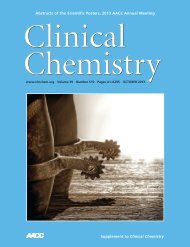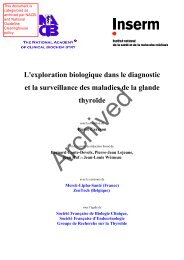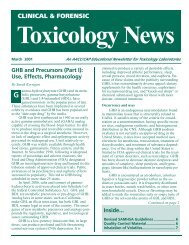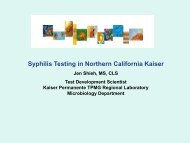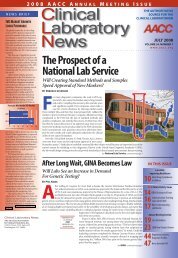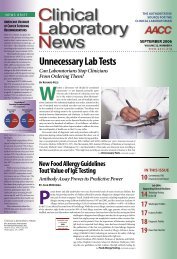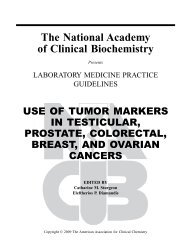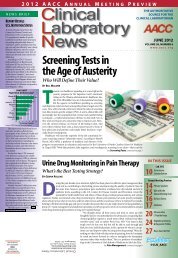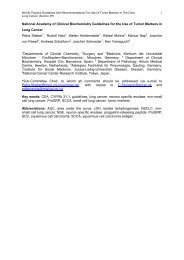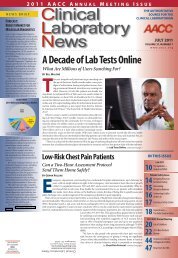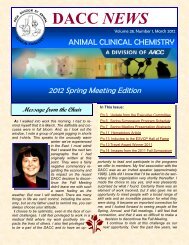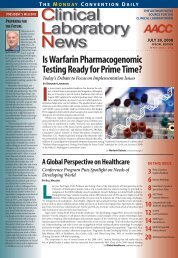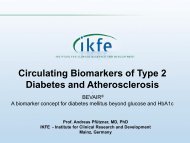oCtoBeR 2010 - American Association for Clinical Chemistry
oCtoBeR 2010 - American Association for Clinical Chemistry
oCtoBeR 2010 - American Association for Clinical Chemistry
Create successful ePaper yourself
Turn your PDF publications into a flip-book with our unique Google optimized e-Paper software.
labcorp to purchase<br />
genzyme genetics <strong>for</strong> $925m<br />
laboratory Corporation of <strong>American</strong><br />
Holdings announced it will acquire<br />
Genzyme Genetics <strong>for</strong> $925 million. The<br />
acquisition is aimed at expanding the firm’s<br />
capabilities in several testing areas, including<br />
reproductive, genetic, and hematologyoncology.<br />
According to David King, chairman<br />
and CEO of LabCorp, the purchase<br />
of Genzyme Genetics will also increase the<br />
company’s ability to per<strong>for</strong>m clinical trials<br />
as a central laboratory.<br />
beckman coulter’s ceo resigns<br />
scott Garrett, chairman, president, and<br />
chief executive officer of Beckman<br />
Coulter, announced his resignation, effective<br />
September 6, <strong>2010</strong>. Garrett had been<br />
with the company since 2005 and had recently<br />
led the integration of Olympus labbased<br />
diagnostics business into Beckman<br />
Coulter. J. Robert Hurley has been named<br />
interim president and CEO until the firm<br />
finds a permanent successor to Garrett.<br />
salk, san<strong>for</strong>d-burnham to<br />
use $21m grant <strong>for</strong> hiv ef<strong>for</strong>t<br />
salk Institute of Biological Studies and<br />
the San<strong>for</strong>d-Burnham Medical Research<br />
Institute have announced that they<br />
will conduct systems biology-based studies<br />
of the earliest immune system responses<br />
to HIV infection with a $21 million grant<br />
from the National Institutes of Health.<br />
The multi-center research project will include<br />
DNA sequencing, expression analysis,<br />
RNAi analysis, and mass spectrometry,<br />
designed to discover the cellular protein<br />
mechanisms that protect against HIV.<br />
nih awards rheonix grant to<br />
develop poc Test <strong>for</strong> uTis<br />
rheonix, a microfluidics firm, has received<br />
a $233,044 supplemental grant<br />
from the National Institutes of Health,<br />
which will be used to develop a point-ofcare<br />
test <strong>for</strong> urinary tract infections (UTI).<br />
According to the firm, the test will allow all<br />
components of a multiplex molecular diagnostic<br />
to be integrated onto a 1-mm thick,<br />
palm-sized polystyrene chip. The grant<br />
supplements an earlier NIH award to develop<br />
a fully automated molecular diagnostic<br />
<strong>for</strong> identifying sexually transmitted infections<br />
and increases the scope of the work<br />
to include the molecular detection of UTI.<br />
nih to fund neurobiological<br />
assay research<br />
The National Institutes of Health announced<br />
that beginning in 2011 it will<br />
provide as much as $5 million in grants<br />
to develop molecular and cellular assays<br />
that can measure and analyze changes<br />
iNdustry<br />
p r o f i L e s<br />
p r o f i L e s<br />
in the function of brain cells. According<br />
to NIH, this grant program will fund research<br />
projects that seek to develop new<br />
technologies that can optimize, automate,<br />
standardize, and validate measures<br />
of molecular and cellular events that are<br />
relevant to brain function. These highthroughput<br />
tools should enable efficient<br />
screening of small molecules, peptides, or<br />
genetic perturbations.<br />
mlc dx to Target biomarkers<br />
nih to fund sigma-aldrich’s<br />
With dna Technologies<br />
cardiovascular disease research<br />
m s<br />
LC Dx, a San Francisco-based mo- igma-Aldrich has signed an agreement<br />
lecular diagnostics firm, has raised with the National Heart, Lung, and<br />
almost $6 million in private financing, it Blood Institute (NHLBI) of the National<br />
disclosed in a document filed with the U.S. Institutes of Health, and Boston University<br />
Securities and Exchange Commission. Ac- (BU) to develop methods to measure sevcording<br />
to the firm, it currently has a pateral potential biomarkers of atherosclerotic<br />
ent application <strong>for</strong> a method that uses cardiovascular disease (CVD) using plasma<br />
DNA sequencing technology to identify samples from NHLBI’s Framingham Heart<br />
biomarkers of autoimmune disorders and Study. Sigma-Aldrich will work with NHLother<br />
diseases. The method includes isolat- BI and BU to provide analysis of plasma<br />
ing samples from a subject, one or more samples from 7,000 participants that will<br />
rounds of nucleic acid amplification, spa- examine 180 potential biomarkers <strong>for</strong> CVD.<br />
tially isolating individual nucleic acids, and The project will be funded by NHLBI under<br />
sequencing nucleic acids.<br />
a research subaward agreement with BU.<br />
Presents a Conference<br />
Practical Applications of Mass Spectrometry<br />
In the <strong>Clinical</strong> Laboratory<br />
November 15, <strong>2010</strong><br />
Johns Hopkins Medical Institution’s Owens Auditorium<br />
Baltimore, MD<br />
Mass spectrometry is fast becoming the analytical method of choice<br />
<strong>for</strong> many clinical assays. This program will tackle and attempt to<br />
demystify some of the issues that have arisen as this technology<br />
evolves into a routine laboratory tool.<br />
Lab professionals often describe “mass spec” as a complimentary<br />
method to immunoassay, but no one doubts it has technological<br />
advantages over immunoassay <strong>for</strong> certain applications. Attend this<br />
conference to � nd out if mass spec has a place in your lab, and learn<br />
about clinical applications where it is now routinely used.<br />
Leading clinical mass spec experts will show you:<br />
• Advantages and challenges of mass spec<br />
• Basics of MS method evaluation<br />
• Pros and cons of mass spec vs. immunoassay<br />
In addition, conference faculty will examine some current applications in the clinical<br />
lab, including:<br />
• Therapeutic drug monitoring<br />
• Toxicology screening and con� rmation<br />
• Steroid and vitamin D analyses<br />
• Thyroid, thyroglobulin, and catecholamine testing<br />
For more in<strong>for</strong>mation or to register, please visit<br />
the AACC web site at www.aacc.org.<br />
This educational event is supported,<br />
in part, by a generous educational<br />
grant from Thermo Fisher Scienti� c.<br />
CliniCal laboratory news <strong>oCtoBeR</strong> <strong>2010</strong> 21



